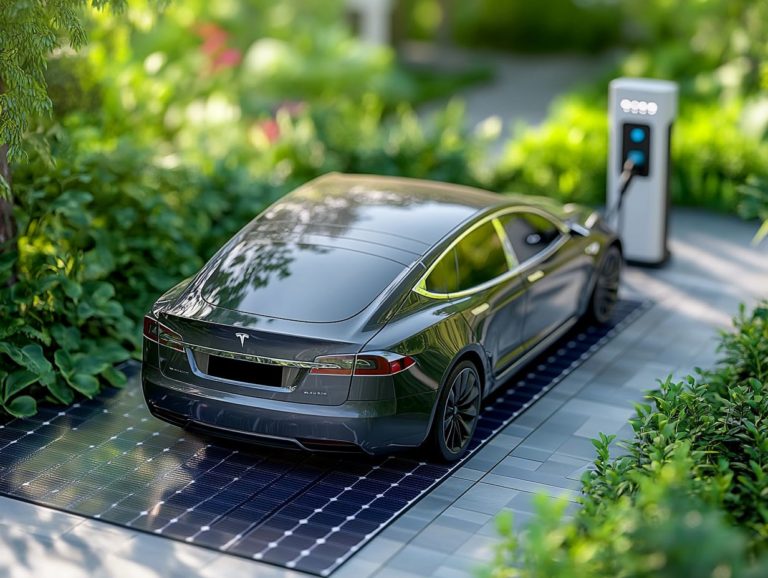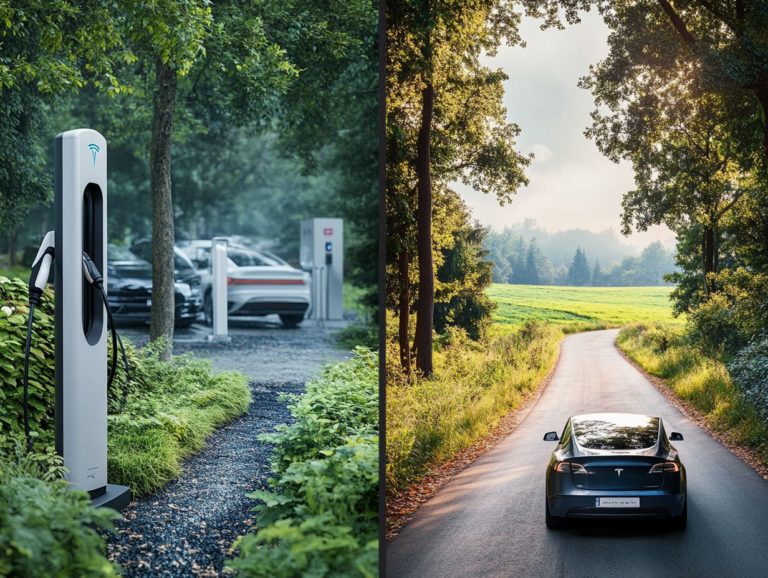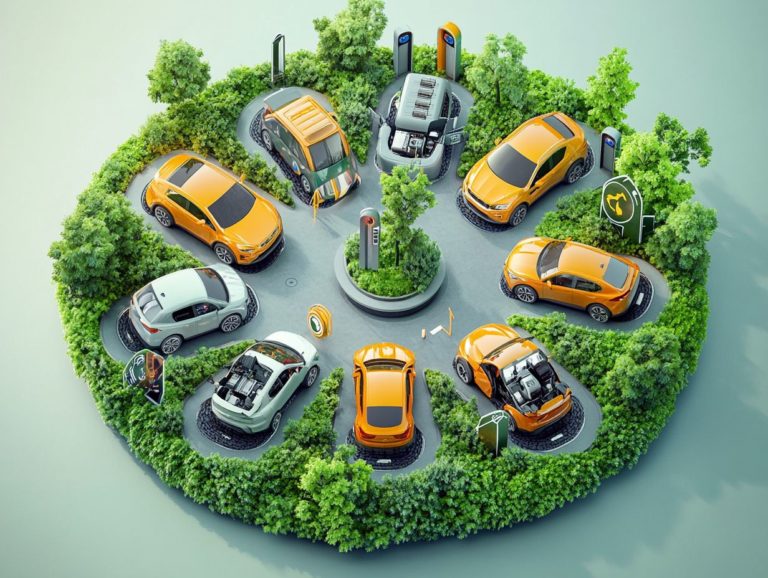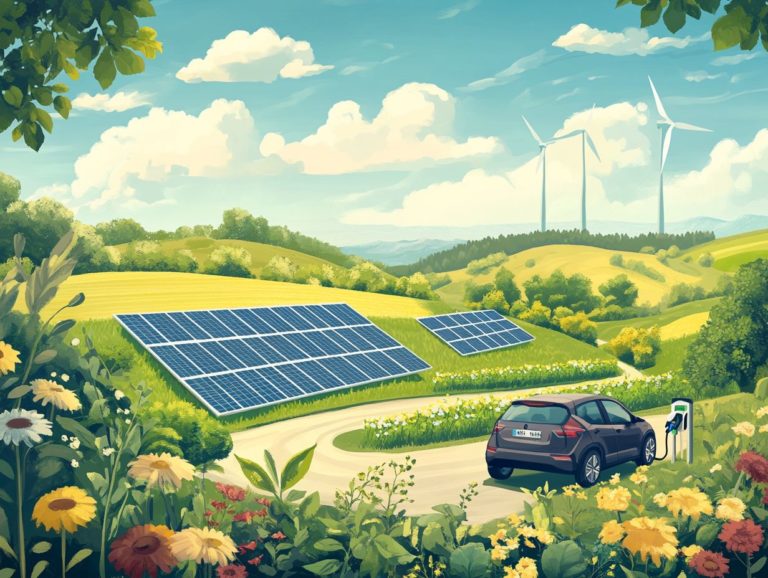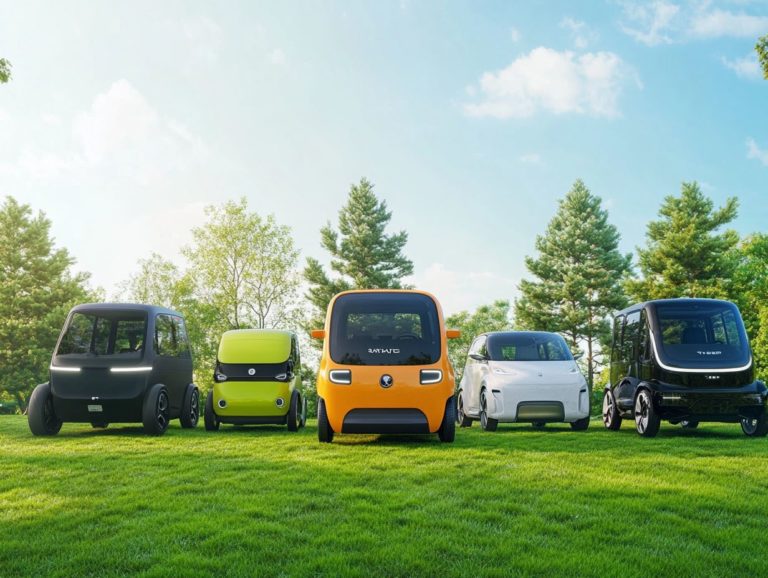The Economic Benefits of Electric Vehicle Adoption
Electric vehicles (EVs) are revolutionizing the automotive landscape, presenting a cleaner, more sustainable alternative to traditional cars.
Let s dive into the exciting world of electric vehicles and discover their incredible benefits!
This exploration covers different types of EVs, emphasizing their environmental and economic advantages for both consumers and governments.
Challenges like infrastructure and costs still exist, but innovative solutions and proactive government initiatives are making it easier for EVs to gain traction.
Uncover the multifaceted impact of electric vehicles on our world and see how they are shaping a sustainable future.
Contents
- Key Takeaways:
- Why Electric Vehicles are the Future of Transport
- The Environmental Impact of EVs
- Economic Benefits for Consumers
- Economic Benefits for Governments
- Challenges and Solutions for Widespread Adoption
- Frequently Asked Questions
- What are the economic benefits of electric vehicle adoption?
- How do electric vehicles save on fuel costs?
- Where can I find additional resources on electric vehicles?
- What government incentives are available for electric vehicle adoption?
- Is there a cost difference in maintaining electric vehicles compared to traditional vehicles?
- How does electric vehicle adoption benefit the environment?
- What impact does electric vehicle adoption have on job creation?
Key Takeaways:

- EVs cut emissions and fight climate change.
- They offer lower operating costs, leading to long-term savings on fuel and maintenance.
- Governments benefit by reducing reliance on fossil fuels and boosting local economies through job creation.
Why Electric Vehicles are the Future of Transport
Electric vehicles represent a groundbreaking transformation in the transportation sector. They utilize the latest technology that makes batteries better and longer-lasting to help reduce urban congestion and climate emissions.
With options like hybrid electric vehicles and plug-in hybrids, EVs are becoming essential in modern transport.
Countries like the United States, China, and various European nations are pushing for more EV adoption, making the case for electric alternatives compelling.
This transition offers environmental benefits and promises job creation and better public health.
Definition and Types of EVs
Electric vehicles (EVs) use electric motors powered by batteries instead of traditional engines. This category includes fully electric vehicles, hybrid electric vehicles, and plug-in hybrids.
Fully electric vehicles operate solely on electric power, showcasing advanced battery technology that allows for longer ranges and quicker charging, thus promoting electric mobility.
Hybrid electric vehicles combine a conventional engine with an electric motor, providing efficient operation while benefiting from both power sources.
Plug-in hybrid electric vehicles can be charged, enabling electric-only trips while still having a backup fuel source for longer journeys. Innovations in battery technology not only improve these EVs but also significantly reduce their environmental footprint, making them a sustainable choice for the future.
The Environmental Impact of EVs
Electric vehicles provide a significant environmental advantage by lowering climate emissions and improving air quality. By embracing EVs, you contribute to tackling urgent issues like air pollution and fostering a greener future powered by renewable energy.
Reducing Carbon Footprint
Using renewable energy to charge EVs can greatly lower their carbon footprint, making them vital in the global effort to mitigate climate emissions.
This reduction occurs because charging EVs with solar, wind, or hydroelectric power allows them to operate much cleaner than traditional vehicles that rely on fossil fuels.
As the energy grid incorporates more renewable sources, the benefits of driving an EV become even clearer, encouraging a comprehensive approach to environmental conservation and promoting a more sustainable lifestyle.
Join the revolution in sustainable transport and consider making your next vehicle an electric one!
Economic Benefits for Consumers
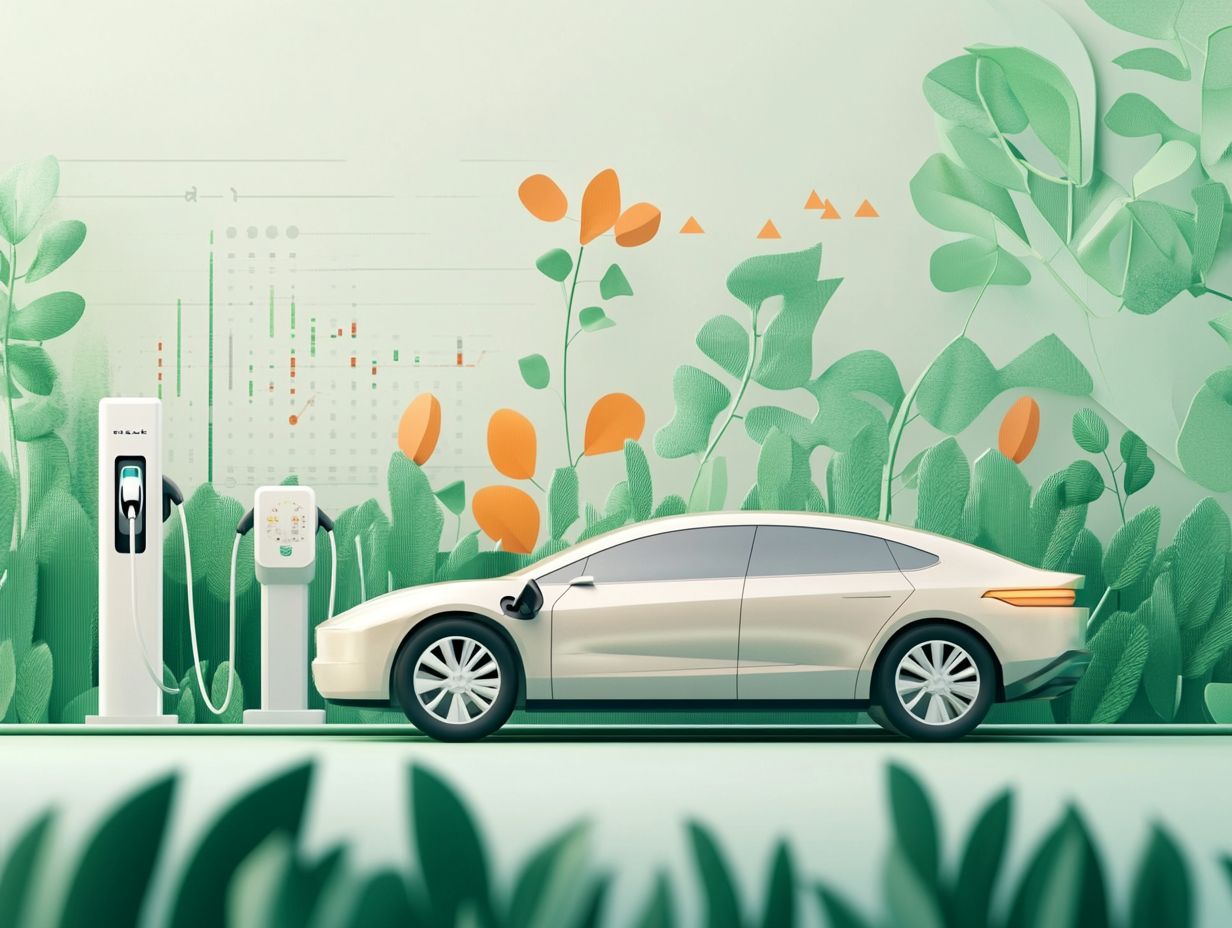
Imagine the thrill of enjoying lower operating costs and significant fuel savings by choosing Electric Vehicles (EVs)! The impact of EVs on the economy highlights the substantial economic advantages compared to traditional vehicles.
A range of incentives and tax credits is available to encourage your transition to EVs. This makes the switch not just environmentally friendly, but also financially savvy.
Lower Operating Costs
One of the standout economic benefits of Electric Vehicles is their lower operating costs. This is primarily due to reduced fuel expenses and significantly lower maintenance requirements compared to traditional gasoline vehicles.
As an EV owner, you ll save a considerable amount on fuel, since electricity tends to be cheaper than gasoline on a per-mile basis. While a gasoline vehicle might cost you upwards of $100 per month for fuel, you could cover the same distance in your electric vehicle for a mere fraction of that often around $30.
Plus, electric vehicles have fewer moving parts, which leads to lower maintenance expenses. With no oil changes on your to-do list and fewer components that could wear down, you can enjoy greater reliability and save on repairs throughout the life of your vehicle.
These financial advantages make transitioning to an electric vehicle an increasingly attractive choice for discerning consumers like yourself, especially considering the impact of electric vehicles on the job market.
Incentives and Tax Credits
Government incentives and tax credits play a pivotal role in promoting the adoption of Electric Vehicles (EVs). They offer financial benefits that significantly enhance the economic rationale for transitioning from traditional vehicles to electric alternatives.
These programs help reduce your initial purchase costs, making the switch more manageable. They also contribute to a positive environmental impact. At the federal level, you can enjoy tax credits of up to $7,500 off the purchase price of qualifying EVs.
- Various states implement their own initiatives, which can include additional tax rebates.
- Special financing options may also be available.
- You might benefit from perks like reduced registration fees.
- Access to carpool lanes can further sweeten the deal.
With such a wide array of available support, the financial advantages of choosing an EV become increasingly enticing. This paves the way for a cleaner and more sustainable future.
Make the switch today and start saving!
Economic Benefits for Governments
Governments stand to gain significantly from the shift to Electric Vehicles. This transition reduces dependence on imported fossil fuels and enhances energy security, as highlighted in the economic impact of electric vehicles on cities.
Moreover, it stimulates job creation within the rapidly growing electric mobility sector. This makes the overall market transition much smoother.
Reducing Dependence on Fossil Fuels
The transition to Electric Vehicles plays a pivotal role in reducing reliance on imported fossil fuels. This ultimately enhances national energy security and fosters sustainable energy solutions.
By shifting your focus towards EVs, you can diversify energy sources and make your economy less susceptible to the unpredictable fluctuations of fossil fuel markets. This strategic move alleviates pressure on foreign oil supplies while strengthening domestic power generation from renewable resources.
As dependence on traditional hydrocarbons wanes, nations can effectively reduce the risks tied to geopolitical conflicts surrounding energy resources. Energy security refers to the uninterrupted availability of energy sources at an affordable price. Therefore, the widespread adoption of electric transportation not only champions a greener planet but also reinforces your nation’s energy autonomy and resilience against external energy price shocks.
Boosting Local Economies
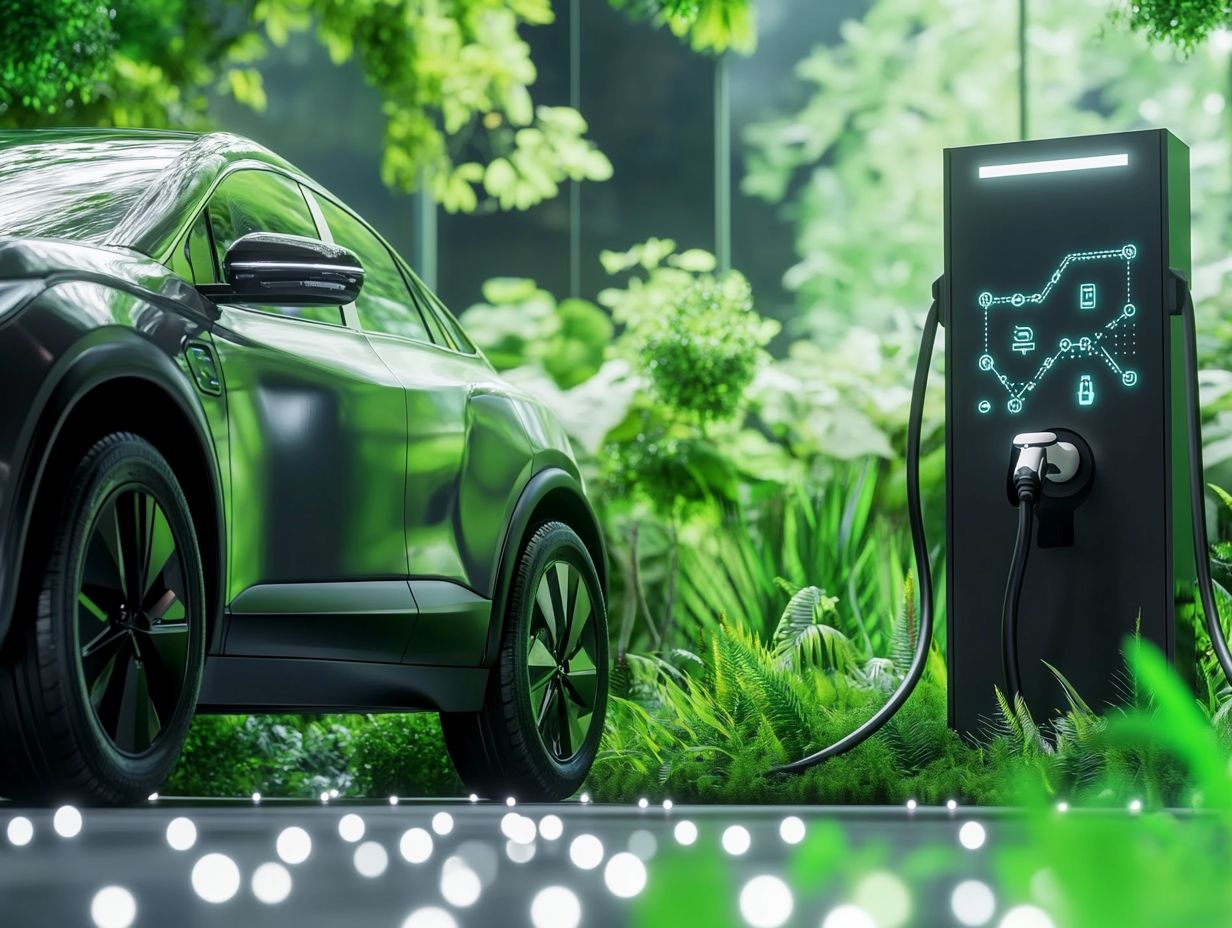
Electric Vehicles (EVs) do more than just reduce emissions; they create jobs in their production and support industries. They invigorate local economies as we transition to a more sustainable transportation infrastructure, highlighting the impact of charging infrastructure on EV adoption.
As local manufacturers ramp up their production capabilities, you may notice an uptick in job opportunities across various sectors, from engineering to logistics. The rise of EV technology encourages investments in specialized training programs. This ensures that you have access to a skilled workforce ready to meet the demands of the electric mobility industry.
With the expansion of charging infrastructure, local businesses stand to benefit from increased foot traffic. The savings you experience in fuel and maintenance costs empower you to reinvest in your neighborhood. Embracing electric mobility isn t just about being green; it s an exciting chance for your community to thrive economically!
Challenges and Solutions for Widespread Adoption
Despite the myriad benefits of Electric Vehicles (EVs), you face several challenges that hinder their widespread adoption. The high cost premium, coupled with insufficient charging infrastructure, presents significant barriers that you must navigate.
Infrastructure and Cost Concerns
A major hurdle in your journey toward Electric Vehicle (EV) adoption is the inadequate charging infrastructure. This pairs with the perception that EVs carry a cost premium compared to traditional vehicles.
This scenario often leaves you grappling with uncertainty about whether you’ll be able to recharge your vehicle conveniently or if it aligns with your budget. The scarcity of charging stations raises concerns about daily practicality. The higher initial price tag of EVs might hold you back from making the switch.
The perceived lack of widespread and reliable charging options can trigger anxiety about long-distance travel. This complicates your decision-making process further. By tackling this infrastructure issue and engaging in open conversations about the total cost of ownership, more consumers could be encouraged to embrace electric vehicles. This ultimately paves the way for a more sustainable future.
Government Support and Initiatives
Government support and initiatives play a crucial role in breaking down barriers to Electric Vehicle (EV) adoption. They equip you with the necessary resources and incentives to transition to electric mobility more seamlessly and attractively.
One effective strategy to achieve this is through funding programs that aid manufacturers in creating more efficient and affordable EV models. Establishing a strong charging infrastructure is essential. By investing in the expansion of charging stations in both urban and rural areas, governments can alleviate range anxiety, making electric vehicles a practical choice for you and others.
Offering consumer incentives such as tax rebates, grants, or favorable loan terms can motivate you to opt for electric vehicles over traditional ones. These combined efforts amplify the presence of electric mobility in the market and contribute to a more sustainable future.
Frequently Asked Questions
What are the economic benefits of electric vehicle adoption?
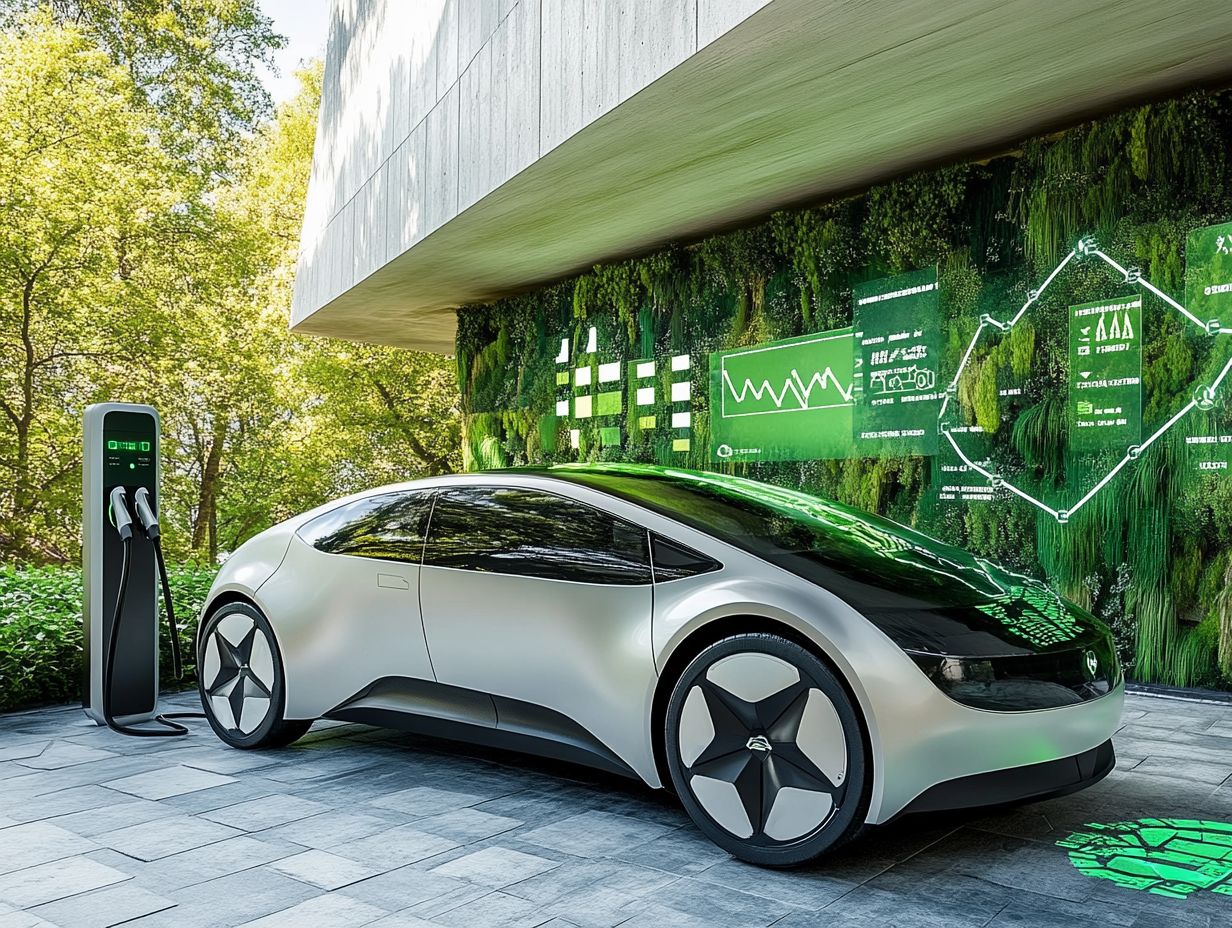
Discover the exciting economic perks of electric vehicle adoption! Cost savings on fuel and maintenance, government incentives, and job creation in the electric vehicle industry are just a few benefits highlighted in the global impact of electric vehicle adoption.
How do electric vehicles save on fuel costs?
Electric vehicles use electricity instead of gasoline, which is generally cheaper. This can result in significant savings over time, especially for drivers with long commutes or those who regularly drive long distances.
Where can I find additional resources on electric vehicles?
Explore local programs that can help you make the switch today! For more information on electric vehicles, check out local government websites or dedicated EV resources.
What government incentives are available for electric vehicle adoption?
Many governments offer incentives for purchasing electric vehicles. These include tax credits, rebates, and waived registration fees. Such incentives can significantly reduce the upfront cost of buying an electric vehicle.
Is there a cost difference in maintaining electric vehicles compared to traditional vehicles?
Electric vehicles have fewer moving parts and don t require oil changes. This results in lower maintenance costs. The braking system also helps recharge the battery, further reducing wear on brake pads.
How does electric vehicle adoption benefit the environment?
Electric vehicles produce zero emissions. This helps to reduce air pollution and tackle climate change. In the long run, it can lower healthcare costs linked to air pollution.
What impact does electric vehicle adoption have on job creation?
As electric vehicle demand rises, more workers are needed in the industry. This includes jobs in manufacturing, sales, and maintenance, driving economic growth through job creation.

